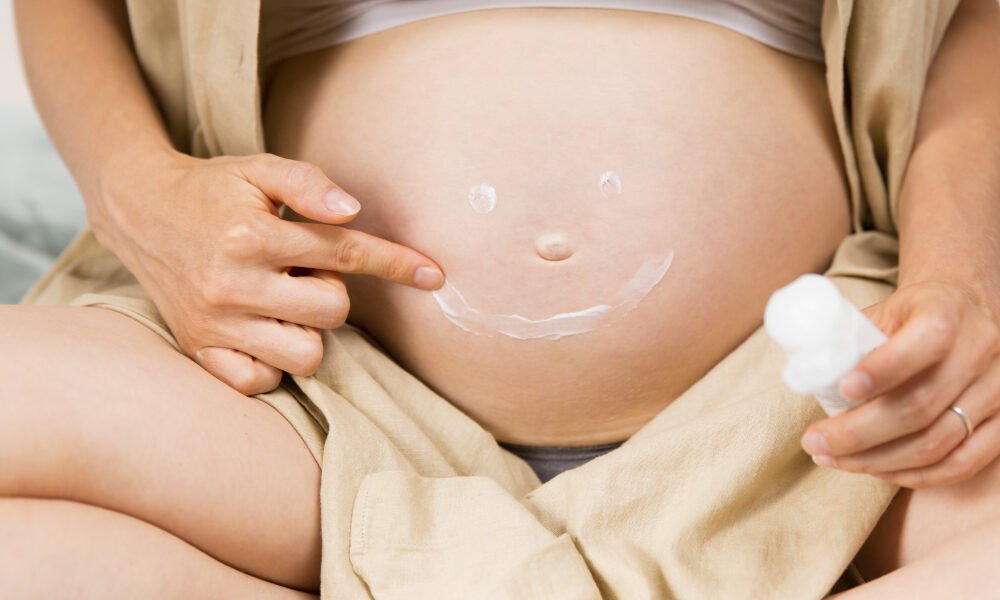Whether it’s the first time or later, becoming a mother is always a milestone moment in any woman’s life. However, it also comes with its own share of challenges. From morning sickness and swollen legs to dietary changes and skincare issues, there are many aspects of pregnancy safe skin care that we all talk about.
One common topic is the pregnancy glow – how the skin looks spotless and the hair shines. Unfortunately, for some women, this may not be the case. They may experience darkening of the skin, new acne, and hair fall. These are just a few examples of the multiple skin issues that can disturb a woman during pregnancy. On top of that, it is important to do things that are safe during pregnancy safe skin care.
A lot of women face the problem of darkening of the skincare in pregnancy. This is known as hyperpigmentation. The reason for this darkening of the skin is excessive production of melanin, which appears in the form of dark spots and brown patches on the forehead, upper lip, and cheekbones. This happens under the influence of hormones like melanocyte-stimulating hormone and progesterone. Thankfully, it’s reversible.
Pregnancy Safe Skin Care
Becoming a mother for the first time or later is always a milestone moment in any woman’s life. It comes with its own share of challenges such as morning sickness, swollen legs, dietary changes, and skincare issues. Pregnancy glow is often talked about, with the skin looking spotless and the hair shining. However, for some women, the reality may be different, with issues like darkening of the skin, new acne, and hair fall. These multiple skin issues can disturb a woman during pregnancy.

During pregnancy, many women face the problem of darkening of the skin at various places on the body, known as hyperpigmentation. This is caused by excessive production of melanin under the influence of hormones like melanocyte-stimulating hormone and progesterone. The dark spots and brown patches near the forehead, upper lips, and cheekbones are known as the mask of pregnancy. Fortunately, this hyperpigmentation is reversible and can be managed with proper sun protection (at least SPF 30) and certain skin lightening agents like kojic acid, vitamin C, and azelaic acid. It’s important to avoid over-the-counter triple combinations that contain steroid-based creams with tretinoin and hydroquinone without the advice of a gynecologist and dermatologist.
There are no absolute treatments for freckles, but using proper broad-spectrum sunscreen and makeup can help cover them up. Acne can also occur during pregnancy due to increased oil production under the influence of hormones. Topical clindamycin-containing creams, azelaic acid-based creams, benzoyl peroxide, and niacinamide are safe to use in pregnancy. However, it’s important to avoid topical tretinoin, hydroquinone, salicylic acid in higher concentrations, as they may pose a risk to the fetus.
Skincare in Pregnancy
Night Skin Care Routine
A safe skincare routine during pregnancy should include a mild cleanser, vitamins B and C-based serum, moisturizer, and sunscreen for the morning routine. For the night skin care routine for best skin care products, active ingredients like glycolic acid, vitamin C, and peptides can be used. Makeup products like primers, BB creams, blushers, mascaras, and eyeliners are also safe to use during pregnancy.
Ammonia-free hair colors are considered safe to use during pregnancy, but it’s best to avoid chemical treatments in the first trimester of pregnancy. Hair spas are safe to do during pregnancy, but treatments like hair botox, keratin treatment, and rebonding that may require the use of formaldehyde should be avoided. Other salon treatments like facials, manicures, pedicures, and waxing are generally safe but require attention to hygiene and sanitation.
It’s best to avoid getting a tattoo during pregnancy due to the risk of infection and potential harm to the fetus. Procedures like Botox fillers and chemical peels should also be avoided during pregnancy. Laser hair reduction is not considered safe during pregnancy due to insufficient data on its safety.
Stretch marks are a common occurrence during pregnancy due to the sudden breakage of elastin and collagen. While using oils like bio oil, vitamin E oil, or almond oil may not prevent stretch marks completely, it may help with skin hydration and comfort.


Comments